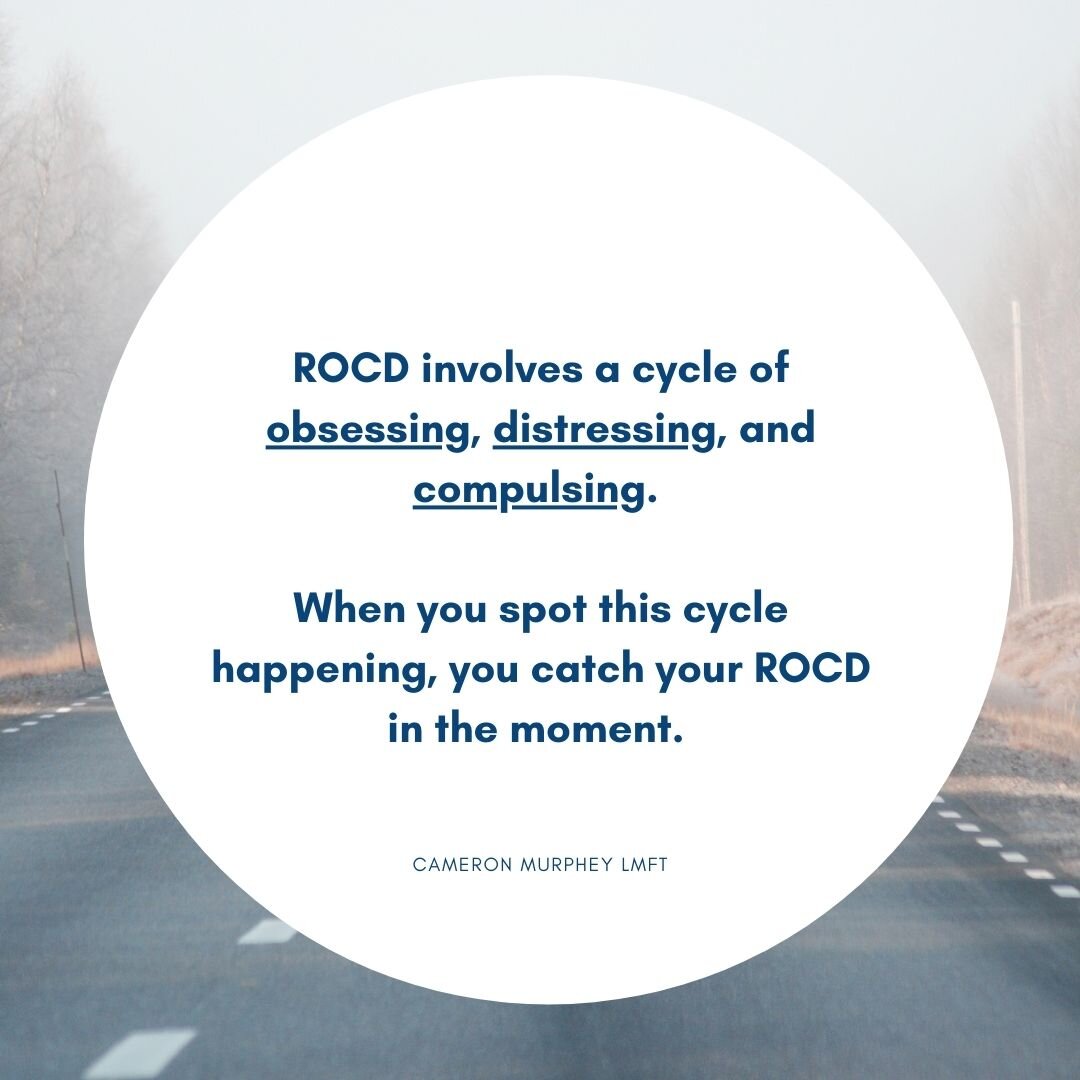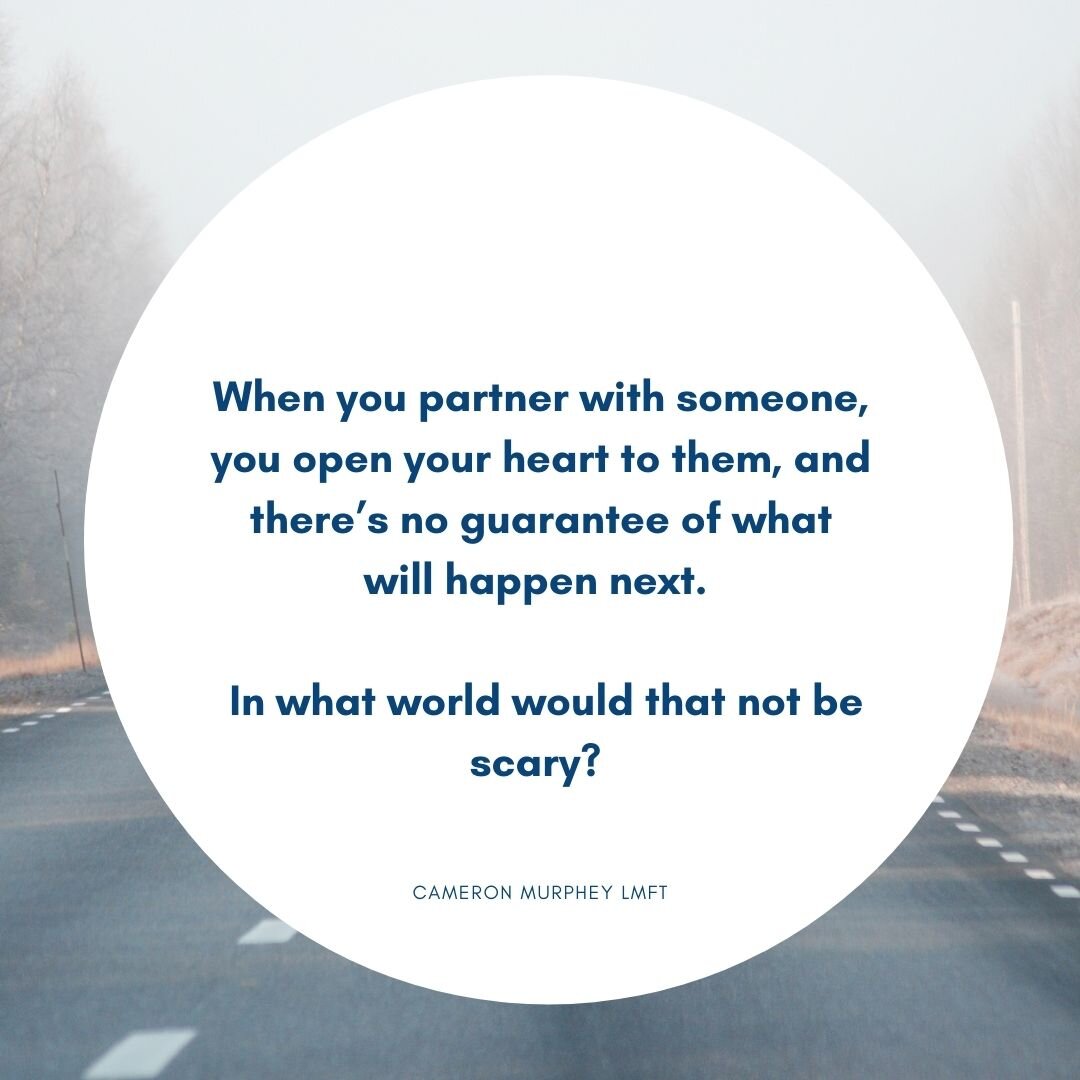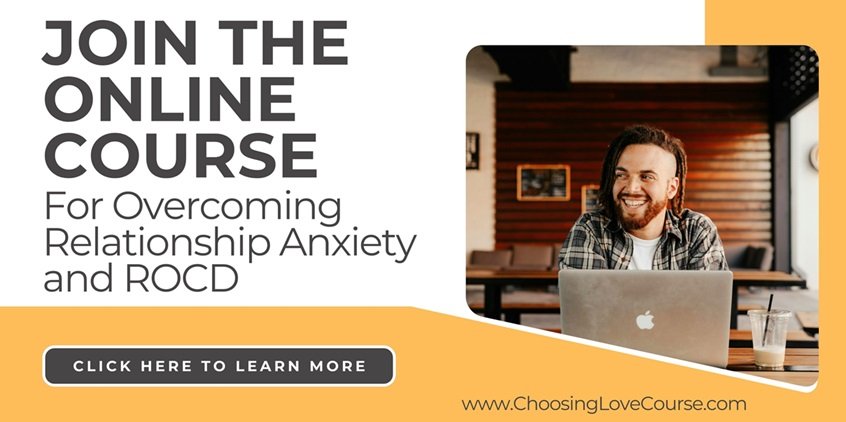Is this ROCD or the Wrong Relationship?
Is this ROCD or the wrong relationship?
“Is this ROCD or the wrong relationship?” You feel really anxious and confused about your relationship. You don’t know if this is ROCD scaring you, or if your anxiety is a warning sign that you’re in the wrong relationship. How do you tell the difference?
In this post, I give you some ideas for how to tell the difference between ROCD or the wrong relationship.
I also point out when trying to answer this question tips over into compulsing. It’s important to know when you’re compulsing, since stopping compulsing is one of the most useful steps you can take to overcome relationship OCD.
How to recognize ROCD
ROCD involves a cycle of obsessing, distressing, and compulsing. When you spot this cycle happening, you catch your ROCD in the moment. Let’s look at each.
Obsessing
Obsessing is worrying, and it usually comes in the form of what-if thoughts about your partner or your relationship. For example,
What if this isn’t the right relationship?
What if another person is a better match for me?
What if I don’t love my partner enough?
What if I’m not attracted enough to my partner?
What if I would be happier with someone else?
Obsessing can also look like worrying over:
Is my partner really the one?
Is my partner ____ enough? (smart, funny, attractive etc.)
Distressing
People with ROCD can feel an intense amount of anxiety, tension, and dread around not knowing the answers to these questions. The anxiety can be so visceral and consuming that it leaves people not knowing how to function on a daily basis.
People also often fear that the questions are pointing to the truth, and that they’ll “have to” break up with their partner when they discover it.
Compulsing
At the heart of all compulsing is the attempt to answer or eliminate the what-if thoughts that come up when obsessing. For example:
Scanning yourself for loving feelings that would prove you love your partner enough
Looking for evidence that you’re in the right or wrong relationship
Reassuring yourself that your partner is right for you
Distracting yourself from obsessing
Asking others for reassurance, or whether they think your partner is right for you
Sound familiar? Take my free ROCD test to learn more.
ROCD is a cycle
ROCD is a cycle of obsessing, distressing, and compulsing. When you compulse, you might find temporary relief, but not for long. Sooner or later, you’re back to worrying again.
Recognizing when you’re obsessing, distressing, and compulsing is the most reliable way of telling if your anxiety is from ROCD.
“But what if this is the wrong relationship?”
If you’re asking this, check to see if you’re obsessing and compulsing right now. Are you looking for an answer that would give you certainty and stop the questioning? And are you asking this with a sense of urgency?
There’s no shame in this. This is about practicing noticing your ROCD in the moment.
Red Flags
The only serious consideration I give to whether a relationship is “wrong” is to ask about any red flags in the relationship. By red flags I don’t mean your partner leaving wet towels on the floor. I mean repeated incidents of lying, infidelity, abuse or manipulation, untreated addiction, and so on. Things that you would not want for someone you care about.
After checking for red flags, you can move to…
Pulling back the curtain on ROCD
ROCD gives us these broad and absolute words like “right” and “wrong”. But what do they actually mean?
“Wrong relationship” is vague. What would your relationship be “wrong” for?
Wrong for your growth? Wrong for your finances? Wrong for your happiness?
Don’t let ROCD scare you with ambiguous language. Ask for specifics.
Really, ask your ROCD what it means by “wrong relationship”.
Ask your mind what would make a relationship “right”.
When “right” = not anxious
I’ve heard more than once: “If I were in the right relationship, then I wouldn’t feel so anxious.”
This is a common sleight of hand from ROCD and relationship anxiety.
Relationship OCD commonly sets up a standard that you shouldn’t feel anxious doing one of the scariest and most vulnerable things that humans ever do: partnering with another person. But when you partner with someone, you open your heart to them, and there’s no guarantee of what will happen next. They could leave you. They could disappear. They could die in an accident. They could have an affair. — In what world would you not feel afraid to partner with someone when anything could happen?
This is the kind of radical uncertainty that frightens us, especially those of us more prone to anxiety. And obsessing-compulsing is one way of trying to get rid of that uncertainty.
So, check if ROCD is telling you that “wrong relationship” = a relationship in which I don’t have a guarantee that things will go exactly how I want them to.
Or if “wrong relationship” = a relationship in which I might have my heart broken.
Or if “wrong relationship” = a relationship in which I sometimes feel doubt and don’t always feel deep, overflowing love.
If that’s the case, you probably are in the “wrong relationship”. But then again, by those standards, what relationship would ever be “right”?
When you can see through this sleight of hand, you take back a lot of power from ROCD. You get back into a position of choosing what you want for your life, even with the risks involved.
What recovery from relationship anxiety looks like
These are some of the things people say when they’ve taken back power from relationship anxiety.
I have no clue if this is the right relationship, and I’m choosing to go forward anyway, because this person matters to me.
I’m not sure if this is ROCD, but I’m going to treat it as ROCD and see what happens.
I’m really scared of committing, and I’m going to work on figuring out how to commit, because I want to be in a healthy relationship.
Notice the willingness to roll with fear and uncertainty in these statements.
Can you take this kind of stand right now?
If not, that’s okay. I would encourage you to aspire and work toward that level of flexibility. It’s what I work on with most of my clients with relationship anxiety and ROCD.
Meet Cameron
I help men and women do the personal work needed to have healthy, loving relationships. I work with people with a history of relationship anxiety and ROCD, and with people who are facing this kind of anxiety for the very first time.
I know from personal experience how confusing and terrifying relationship anxiety can be, and how urgent it can feel to figure out if you’re in the right relationship or with the right person. I also know that there’s a way out. My job is to guide people through relationship anxiety.
Reach out for a free consultation to see if I’m a good fit for you.
Or check out my online course called Choosing Love - How to Find Peace from Relationship Anxiety and ROCD. It’s on-demand and includes over 3 hours of audio and 10 practical tools to use in regaining clarity.
I am an Oakland therapist and I see clients both in downtown Oakland and online throughout the state of California.
Notes:
See page 177 for a similar behavioral cycle of ROCD. Doron, G., Derby, D. S., & Szepsenwol, O. (2014). Relationship obsessive compulsive disorder (ROCD): A conceptual framework. Journal of Obsessive-Compulsive and Related Disorders, 3(2), 169-180.
This post is intended for educational purposes only. This post is neither intended as advice giving nor as a means for diagnosis. Diagnosis of OCD or any other mental disorder requires live interaction with a licensed mental health professional.




